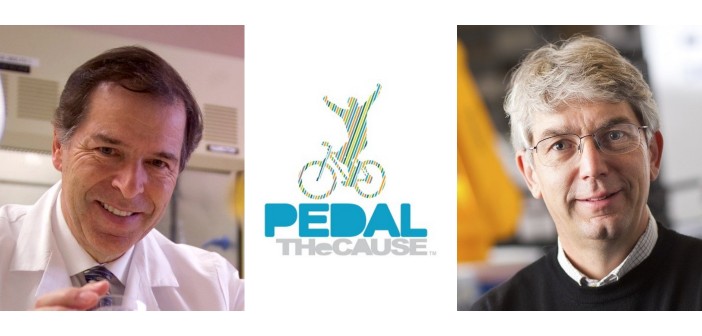Pedal the Cause today presented $1,300,000 in grant funding to four San Diego research institutions to fund seven collaborative research projects. The check presentation was made by Pedal the Cause Executive Director Jay Indovino during a press conference at Rady Children’s Hospital–San Diego this morning.
“From the beginning, we’ve wanted Pedal to be more than just a cycling fundraising event,” stated Indovino. “We want it to be a movement that mobilizes the entire San Diego community to join in the fight to end cancer. The money we’ve presented here today is a monumental step towards that goal.”
From all of us at SBP, thank you to all the riders, virtual riders, volunteers, sponsors, and donors who participated in the 2015 ride to make these grants possible!
Two of the funded projects are co-led by SBP investigators:
KRAS addiction and protein biomarkers of response to anti-KRAS therapy in NSCLC patient-derived xenografts
Hatim Husain, MD (Moores Cancer Center at UC San Diego) Garth Powis, D.Phil. (Sanford Burnham Prebys Cancer Center)
In approximately 25% of lung cancer, the KRAS gene may be mutated. Therapies that are specific for patients who have the KRAS mutation are not currently FDA approved, and this challenge remains a largely unmet need among lung cancer patients. Every year an estimated 39,000 people will die of this molecular form of the disease. In this project, scientists will study proteins that are expressed in these tumors and seek to identify additional markers that may be used to determine who will respond to novel KRAS-directed therapies. Additionally, the funding will also facilitate the study of new therapies developed to precisely target the KRAS protein complex and test its efficacy in KRAS-mutated and pathway-dependent cancer cells. This groundbreaking research could serve the basis of a future clinical trial to evaluate the new anti-KRAS drug for patients with KRAS mutations and pathway dependency.
Targeting stem cell signals in cancer development and progression
Michael Jackson, PhD (Sanford Burnham Prebys Cancer Center) Tannishtha Reya, PhD (Moores Cancer Center at UC San Diego)
To identify new therapeutic targets for cancer, researchers have focused on stem cell programs that are reactivated in cancer. It has been demonstrated that the stem cell signal Musashi (Msi) is highly upregulated during leukemia development and that its blockage can inhibit tumor growth and progression. Data suggests that targeting Msi may provide a new strategy for therapy. To move this work forward to the clinic, grant funding will be used to develop inhibitors of Msi and test their efficacy against cancer growth. This study has the potential to identify a new class of therapeutics for cancers that are largely unresponsive to current therapies.
